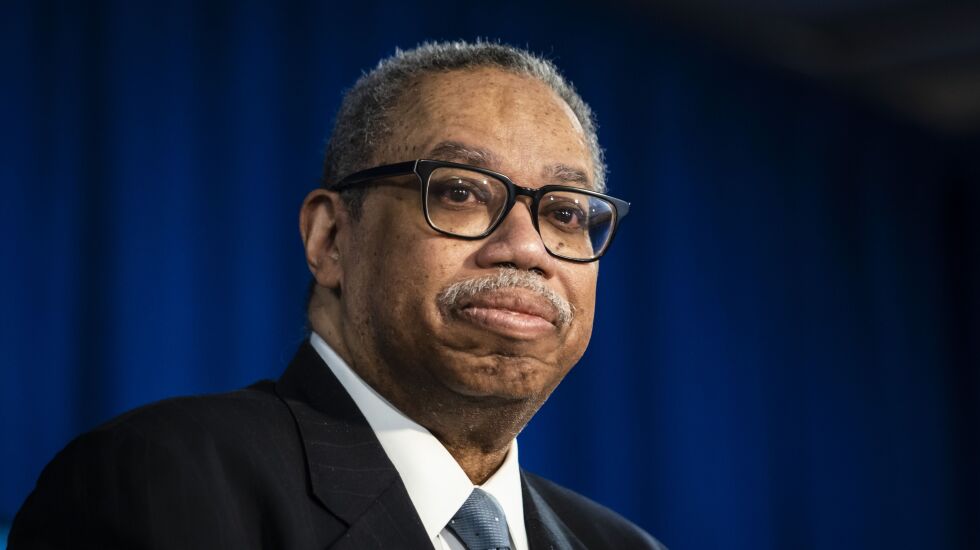
The Chicago Transit Authority’s new $1.9 billion budget will prioritize staffing and improved service in the hopes of getting the agency back on track, President Dorval Carter told a regional transit board Thursday.
Carter and his team were presenting CTA’s 2024 budget before the Regional Transportation Authority (RTA) board around the same time a Yellow Line train crashed into railroad equipment and injured dozens of riders. Thursday’s crash is under investigation.
Thursday’s meeting was a scheduled presentation of transit agency budgets in front of the RTA and included officials from Metra and Pace.
No one in the room mentioned the crash near the Howard station on Chicago’s North Side. Carter and his executive team walked the RTA Board of Directors through the agency’s $1.9 billion operating budget for fiscal year 2024 and said they expect to see ridership growth after a steep decline during the COVID-19 pandemic. The agency, which has faced a staffing shortage, said its efforts are ongoing to recruit rail operators and bus drivers.
Just a day earlier, the Chicago Transit Board passed the agency’s 2024 budget, which is a 9% increase over the previous year. At the CTA’s monthly board meeting, Carter once again went on the defensive about the agency’s ongoing struggles to recruit and train rail operators — positions that require a lengthy onboarding process because they are only open to internal hires.
Carter said he increased the training class sizes and continues to look for other ways to expedite the process without jeopardizing rider safety.
“Let me clarify this because there’s a lot of social media suggestion otherwise,” Carter told his board, saying it would be contradictory for him to intentionally “invent or create barriers” to stall the onboarding of new train operators.
“Believe me, there is no one who wants to get service levels back faster than me, for no other reason than it eliminates some of the criticism that I’ve got — the fact that people don’t believe I’m doing it fast enough,” he said. “I am not going to do it in an unsafe manner. I am not going to risk the safety of a million people who ride the CTA everyday to put someone in a seat who isn’t ready to take on that responsibility.”
The CTA hired 100 new rail operators this year. Overall, CTA expects to end 2023 with 2,000 newly hired employees — mostly bus operators and mechanics — but that number is still short of what’s needed to provide full service. The agency has budgeted for a return to 2019 levels but can’t schedule the additional buses and trains until it has the needed workforce.
Meanwhile, the CTA is projecting its ridership to grow by 10% next year. To encourage riders to return, the agency will invest in new technology to better inform riders of train times. It’s also installing additional security measures, including new cameras and lighting.
On Thursday, the CTA also presented to the regional board its $3.6 billion, five-year capital plan that will fund a major Red Line extension and the ongoing transition to an electric bus fleet. The agency is also continuing work to make its stations accessible in line with the Americans with Disabilities Act.
The commuter rail agency Metra also presented its $1.1 billion budget Thursday. Both CTA and Pace will keep fares at current levels, while Metra will be revamping its entire pricing structure starting Feb. 1, 2024. The commuter rail operator will replace its existing 10-zone, distance-based map with four zones. Metra will discontinue its promotional $6 and $10 day passes and a $100 monthly pass.
Pace’s operating budget for next year totals $333.3 million, a 13% increase from 2023, while Metra’s budget will increase 20%.
All three agencies are relying on remaining federal COVID relief dollars to plug budget holes and have projected that money will run out by 2026, a problem frequently referred to as the “looming fiscal cliff.” On Thursday, leaders of all three agencies, and the RTA, acknowledged that failure to find new funding could cripple public transit in the region.
Claudia Morell is a metro reporter covering government and transit issues for WBEZ.







